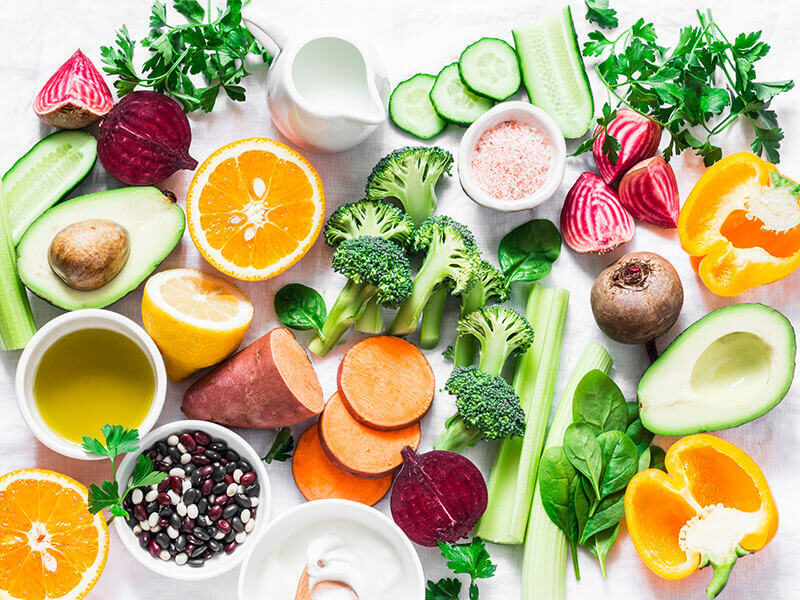The thyroid, a butterfly-shaped gland in your neck present at the front of the neck produces two thyroid hormones T3 and T4. Thyroid hormones are very crucial as they regulate your metabolism, energy levels, mood, body temperature, and even blood pressure.
They regulate multiple biological functions and are important in maintaining proper health. Proper functioning of the thyroid is a predominant factor in maintaining your well-being. An underactive or overactive thyroid can cause numerous problems.
Is your thyroid functioning appropriately? A sluggish thyroid gland can lead to hypothyroidism whereas hyperthyroidism is caused by an overactive thyroid gland. To maintain the optimal functioning of the gland, eating the right food is one of the simplest and the best ways.
Other lifestyle components also largely influence the thyroid gland and the levels of the thyroid hormones. Do you have a problem with your thyroid?
In this article, we will cover everything about the food that you must eat and avoid to maintain proper thyroid levels and achieve proper functioning of the thyroid gland in both the conditions, of hypo and hyperthyroidism.
Hypothyroidism
Hypothyroidism is a condition caused when the body doesn’t release enough thyroid hormones. As we already know, the thyroid is essential for growth, metabolism and cell repair.
As a consequence of the decreased activity of the thyroid, people with hypothyroidism may gain weight and feel tired. Some of the other symptoms include feeling sluggish and low, hair loss and an increased tendency of feeling cold.
The thyroid stimulating hormone, TSH (from the pituitary gland) is responsible for the release of thyroid hormones from the thyroid gland. There are two types of hypothyroidism commonly.
Sometimes, the thyroid gland does not release thyroid hormones even when there is sufficient TSH. This type is called primary hypothyroidism. In secondary hypothyroidism, the thyroid gland doesn’t receive enough TSH.
This results in a slow metabolism and the capacity to burn calories decreases. As a result, you gain weight easily. This slowed-down metabolism comes with numerous health issues such as tiredness, elevated cholesterol levels in the blood, and difficulty in losing weight.
Food alone can not cure hypothyroidism. Right food choices daily along with proper nutrition and medication will help you manage your symptoms and improve thyroid function.
Here are some foods to avoid and to eat for the proper functioning of the thyroid gland (for hypothyroidism)
Foods to eat
If you have hypothyroidism, it is suggested you follow a diet packed with vegetables, fruits and lean meat. Moreover, consuming high-protein foods is considered very beneficial.
Eggs: Eat whole eggs. Iodine and selenium that are found in egg yolk are as important as proteins in egg whites.

Vegetables: You can eat all vegetables. However, cruciferous vegetables need to be consumed in moderate amounts.
Dairy: You may consume all dairy products including cheese, milk, yogurt, etc.
Meat: Lean meat is a must in your diet. All meats including chicken, lamb, etc.
Seeds and gluten-free grains: Chia seeds, flax seeds, quinoa, and rice can be added to your diet.
Non-caffeinated beverages: It is important to stay away from caffeinated beverages and even sugary beverages. Staying hydrated and drinking plenty of water is important.
Seafood: You can include all kinds of seafood into your regular diet; shrimp, salmon, tuna, etc.
As per research, including foods rich in iodine, selenium, and zinc in your diet can be helpful. If you aim to manage your weight along with minimizing other symptoms, a diet that can provide a good amount of protein with low to moderate carbs is recommended.
Nevertheless, medication is highly essential. Medication, as prescribed by your doctor, needs to be taken regularly without fail. We suggest you take your medication at least an hour before you eat your first meal of the day as some of the nutrients in your diet may hinder the absorption of the medication.
Foods to avoid
Luckily, you do not have to avoid many foods if you have hypothyroidism. However, it is important to avoid all sorts of processed foods to avoid excess calorie intake.
Here’s a list of foods that you may avoid:
Highly processed foods: Processed foods like cookies, cakes, burgers, etc. can be a problem if you have hypothyroidism. Being calorie-dense, they may lead to weight gain.

Millets: It is better to avoid all sorts of millets.
Selenium and iodine supplements: Though selenium and iodine are crucial for thyroid health, unknowingly taking excess can cause more harm. It is suggested to take these supplements only under the guidance of a healthcare professional.
Goitrogens: You may have foods that contain goitrogens in moderate amounts. If consumed in excess, they will be irritant to the thyroid. They are soy-based foods (like soy milk and tofu), beverages like coffee, green tea, and alcohol along with certain fruits like peaches and berries.
Tips to manage your weight
Due to slow metabolism, you can gain weight easily if you have hypothyroidism. Maintaining a healthy weight is necessary.
Here are a few strategies to do so:
Diet with low to moderate carbs: this diet is effective in maintaining your weight. However, it is better to not try a ketogenic diet as it can lower your thyroid levels even more (as this diet requires you to eat carbs less than what is recommended).
Yoga, meditation, and exercise: yoga and meditation are said to relieve stress and improve your health. Working out regularly will help you manage your weight easily.
Proper diet and plenty of rest: many studies have shown that practicing mindful eating can help with weight loss in general. Getting a good night’s sleep of at least 7 hours is essential. If not, you may gain weight, especially belly fat.
Hyperthyroidism
In contrast to hypothyroidism, hyperthyroidism is caused by a high amount of thyroid hormone. An overactive thyroid gland producing too much thyroid can be because of many causes.
Some hyperthyroidism cases can be because by genetic reasons. Thyroid cancers and Graves’ disease can commonly cause hyperthyroidism. Symptoms associated with hyperthyroidism are
- Increased appetite
- Sudden weight loss
- Feeling hot or sweating
- Anxiety and irritability
- Fatigue
- Menstrual changes
- Brittle hair
- Large thyroid gland
- Eye changes
- Bowel issues
- Difficulty in sleeping
Elevated levels of thyroid can become toxic to your body. For this reason, treatment is necessary. Anti-thyroid medication as prescribed by a doctor to balance the thyroid hormone levels is the primary treatment. Certain cases may require thyroid surgery or radiation therapy.
Apart from the medication, a diet with the essential nutrients and minerals along with avoiding certain foods can help maintain the optimum levels of thyroid hormone and manage your symptoms. Moreover, this is helpful even in reducing the long-term effects of hyperthyroidism.
If left untreated, it can lead to many life-threatening complications like heart conditions and bone loss.
Foods to eat
Low-iodine foods: As we already know, iodine helps in making thyroid hormones. However, in hyperthyroidism a low-iodine diet is helpful. You may include the following foods;
- Non-iodized salt
- Egg whites
- Oats
- Unsalted nut butter
- Maple syrup
- Potatoes
- Tea and coffee (avoid both dairy and soy-based milk)
Cruciferous vegetables: These vegetables are capable of stopping the thyroid gland from utilizing iodine. Including cauliflower, bamboo shoots, broccoli, and kale are said to be beneficial.

Healthy fats: Protecting thyroid health can be done by including unprocessed fats and fats that are from whole foods. Avoiding non-dairy fats is a crucial step in your low-iodine diet. You may add flaxseed oil, sunflower oil, olive oil, and coconut oil.
Essential vitamins and minerals: Iron, selenium, zinc, calcium, and vitamin D are essential in balancing thyroid hormone levels and their production.
Include green leafy vegetables, lentils, whole grains, poultry, red meat, sunflower, pumpkin and chia seeds, rice, cashews, okra, almond milk, and fatty fish into your daily diet to incorporate these essential nutrients.
Spices: Turmeric, black pepper, and green chilies have anti-inflammatory properties that can protect the thyroid and help maintain its function.
Foods to avoid
Gluten: In some individuals, gluten may cause inflammation of the thyroid gland. It may be beneficial to limit or restrict gluten in your diet. For this, avoid gluten-containing ingredients like wheat, rye, barley, and malt.
Excess iodine: Excess iodine can worsen your condition or can be a cause of hyperthyroidism. According to the national institute of health, the daily ideal requirement of iodine is 150 mcg. But, people with hyperthyroidism must consume iodine in amounts below the recommended level.
As seafood has excess iodine concentration, it is best to avoid eating seafood. Even additives based on seafood must be avoided as much as possible. Dairy products, egg yolks, and iodized salt must be kept away including iodized water.
Caffeine: As we already know, caffeine is said to aggravate anxiety and nervousness. This, as a consequence, can worsen the symptoms of hyperthyroidism. If you are unable to cut down on caffeine completely, try limiting the intake amount.
You may go for better alternatives like herbal teas or apple cider.
Soy: Although soy doesn’t contain excess iodine, it is said to interfere with the treatment you take for hyperthyroidism. You may avoid soy and all soy-based foods like soy milk, tofu and soy sauce alike.

Conclusion
Hypothyroidism is a very common condition, especially in women. It affects about 1-2% of individuals around the world. Fortunately, eating proper nutritious food along with prescribed medication and exercise can be under control.
Maintaining a thyroid-friendly diet can not only minimize the symptoms but you will also notice increased energy levels. In the same way, hyperthyroidism can not be prevented but it is treatable.
The key to maintaining optimal thyroid health (in both conditions) is a healthy lifestyle with the right food choices. Consult a doctor as soon as you notice any symptoms. They may even recommend dietary changes which may be short-term or even long-term.
Following the treatment without fail, eating the right foods, a balanced lifestyle, and exercising will ensure your overall well-being and health.
